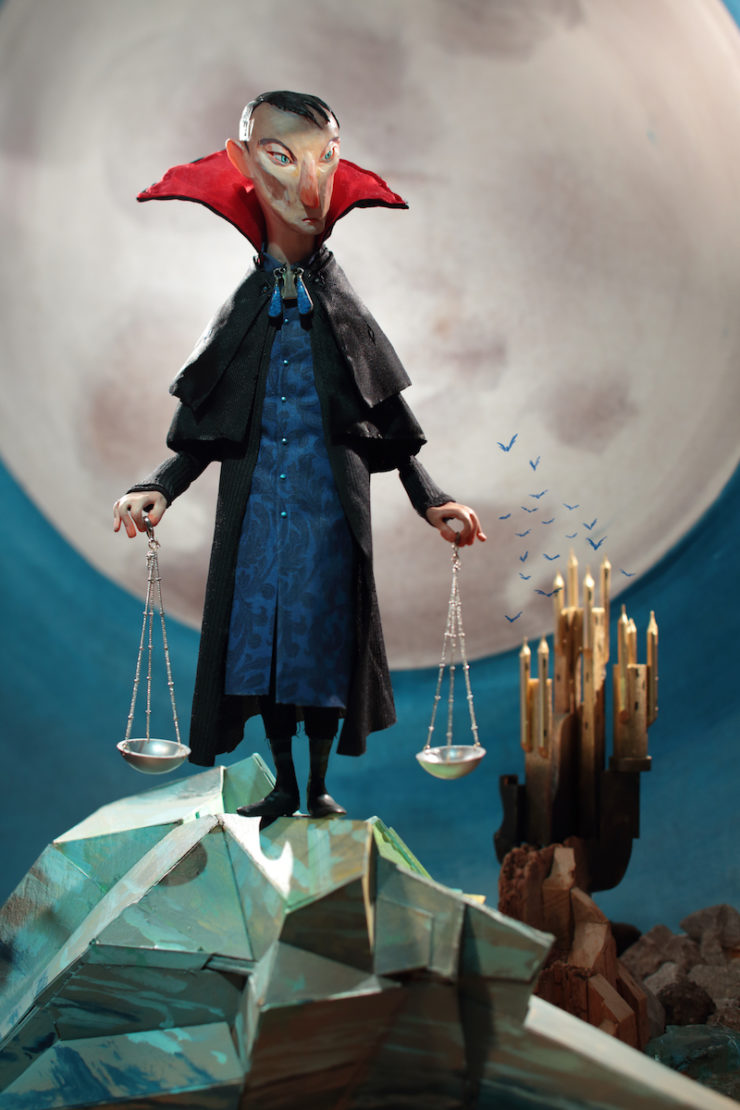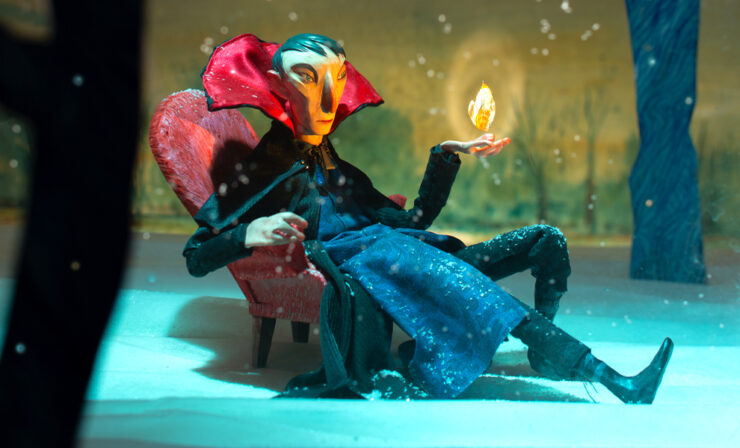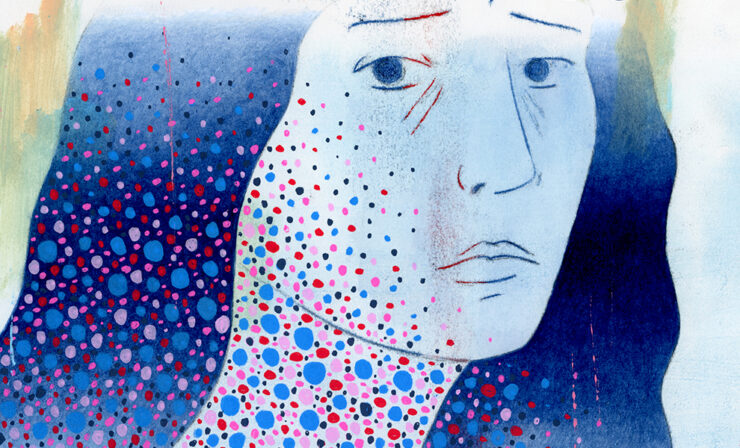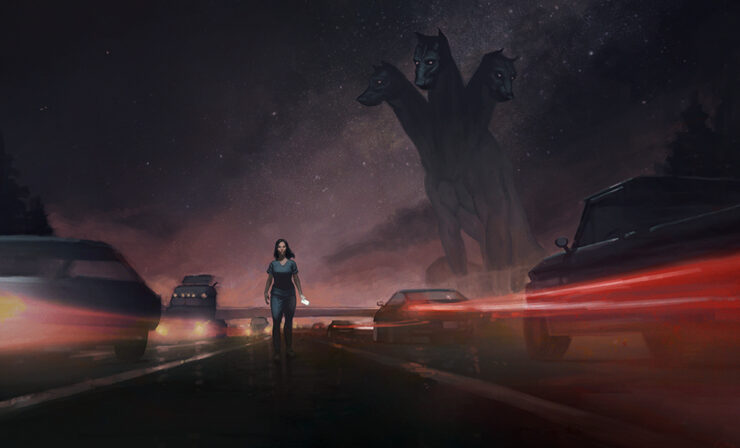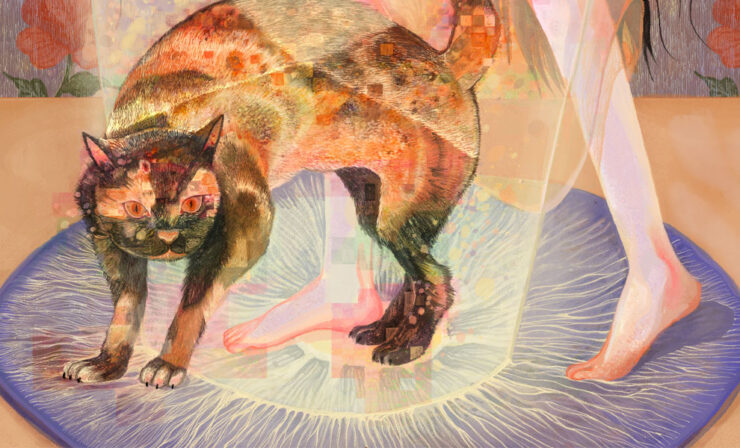No vampire is ever innocent…
The wandering Judge Dee serves as judge, jury, and executioner for any vampire who breaks the laws designed to safeguard their kind’s survival. This new case in particular puts his mandate to the test.
1.
The sun had long set over the distant mountains, and the night world was still but for the two small figures trudging silently under the moonlight. One was tall and thin and moved with a precise energy. The other, smaller, kept hurrying to catch up behind. They wended their path over a dirt road threaded through the fields, earth beaten down under the tread of farmers’ feet.
‘There is a village up ahead, master,’ the smaller figure said. ‘If you are in need of feeding.’
The taller one said, ‘One must feed out of necessity, not greed, Jonathan.’
‘Of course, master.’
Jonathan peered ahead. He was grateful for the moon, for without its light he would find it hard to see, unlike his master. Too often in the moonless nights of their passage he tripped and stumbled and, once, would have fallen into a ravine had not his master interceded.
‘A lesson lost on many of the young ones.’ The master stopped, scenting the air. ‘The postulant feeds from fear and hunger; the novice from greed; the lay vampire, if he has reached that far, feeds for it has learned to accept its nature. Not too little to starve. Not too much to bring about one’s own destruction. Do you understand?’
Buy the Book
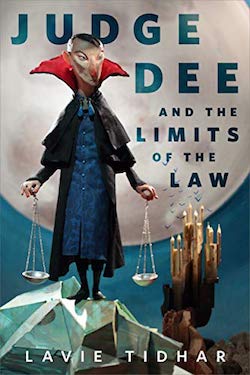

Judge Dee and the Limits of the Law
‘I…yes?’
The master smiled. The smile tore his face in two, revealed his sharp white teeth, reached nearly to those clear and ancient eyes which saw the cruelty of the world long before his companion’s birth. How many decades – centuries – the young assistant never asked. Jonathan was human, and warm-blooded, and young. And his master was Judge Dee.
The master had found him in circumstances Jonathan did not care to dwell on. There had been murder, fire, the flash of swords, the smell of blood. He was buried under a pile of corpses. He would have died.
Then the master appeared out of the night, pulled Jonathan out effortlessly from beneath the pile, carried him to a cave in the hills high above, and restored him to health. He cooked and fed him chicken broth. In all his time, later, with the master, Jonathan had never seen a vampire cook.
His nature was apparent. And Jonathan had seen, had known vampires were in the world. He had not known the judge’s plans for him, but he could guess.
Yet the judge proved him wrong.
This is what Judge Dee said to him:
‘I will not kill you, for you are not my prey. I will not turn you, either. I make no vampires, and you will live and die a mortal man. Perhaps you’ll thank me for it.’
His tone of voice then made it clear the judge was not used to being thanked.
‘Then, what?’ the boy had asked.
‘I need you for a task. That’s all. Show me the way to the lord’s keep, the one who sacked your village.’
Jonathan was afraid then. His mind shied from the nightmares he had witnessed.
‘No,’ he said, ‘do not ask me for that.’
‘I,’ the Judge said mildly, ‘do not ask.’
The Incident at the Hell of Black Rock, as Jonathan, later, in his private journals, titled their adventure, was one that often haunted his dreams. He no longer slept in the night, of course. But nightmares, all the same, came to him when he slept.
The judge, as always, had carried out his task. He passed judgement. And, having concluded his task, he went on his way.
The boy, perhaps not knowing where else to turn, followed him.
And the judge, though he made no comment one way or the other, allowed it to be so.
Now they were two, and travelling the long night, which is all the nights of the world joined into one, and they were companionable. And Jonathan could hear laughter in the distance, and smell meat roasting on coals. And his stomach growled.
‘Well, if you are sure, master…’ he said.
Judge Dee sighed. ‘I suppose we could make a short stop,’ he said.
2.
The inn was warm. The fire burned. Jonathan sank his teeth into the roasted flesh of a pig. Blood poured down his chin. He stuffed a chunk of bread into his mouth. He took a gulp of red wine that dribbled down onto his dirty shirt.
Judge Dee, wrapped in his cloak, his fingers interlaced where his hands rested upon his chest, sighed again.
‘You eat like a vampire,’ he said. It was not meant as a compliment.
‘I am hungry, master,’ Jonathan said. He tried to calculate how many days now it had been since they last stopped. He had subsisted on dried cheese and even drier apples for two days now. His master could be kind, when the mood took him. But, a follower of the ancient Greek philosophy of Asceticism, he often forgot other people were weaker.
‘Well, mind your manners, Jonathan. And wipe your face. Eat slowly. Enjoy each mouthful. You never know if it won’t be your last.’
‘Yes, master,’ Jonathan said. He tried, he really tried. He was just so hungry.
It seemed a prosperous village. The road inn was well-lit and the stables full. The houses seemed clean and well-maintained. A group of Carmelites sat at one table, a gaggle of traders from Venice and Genoa at another. Jonathan stared at the two serving girls, who must have been the landlord’s daughters. Judge Dee stared at the traders. There was a certain similarity in the companions’ twin attentions.
‘Are you sure you won’t feed, master? You must eat, as all beings must eat.’
The master smiled. He did not smile often, but his young companion brought the expression to his face more often than others.
‘I see your hunger is for more than food,’ he said.
Jonathan blushed.
‘They are fetching,’ his master allowed. ‘Though they’re hardly likely to be impressed by your table manners.’
‘Yes, master.’
‘Eat,’ Judge Dee said, dismissing the issue. ‘We should be on our way. The road is long and the case before us is somewhat peculiar.’
‘How so, master?’
Judge Dee frowned.
‘You,’ he said, addressing the traders.
‘Us, sir?’
‘Know you of the Valle di San Filippo?’ Judge Dee said.
The traders exchanged glances.
‘Pleasant enough, sir,’ one of them allowed.
‘Good tomatoes,’ another said.
‘Tomatoes?’ Judge Dee said.
‘And strawberries, in early summer.’
‘I see,’ Judge Dee said. ‘And the Castello d’oro?’
‘Oh, no, sir. You don’t want to go there, sir. Very bad…’ The trader paused in a search for words.
‘Climate?’
‘Yes,’ the trader said, with some relief. ‘Very dark climate, sir. Most unpleasant.’
‘Castello dell’orrore, sir!’ another of the traders said.
The master smiled politely at the pun.
‘The Castle of Horrors, master?’ Jonathan said. That did not sound very nice. But then, following the master involved what passed for horrors on a regular basis, and fresh strawberries almost never.
‘The castle of gold, Jonathan,’ the master said. ‘And it is—’
‘Our destination?’ Jonathan said. He sighed and finished the last of his wine. One of the serving girls turned and flashed a smile at him, but he was no longer paying attention.
‘Of course it is, master,’ he said.
3.
The Castello d’oro perched on the side of the high hill and was built in the new Gothic style. It was a style favoured by Benedictines, with groin vaults and clustered piers, and the walls were stout stone. The moon rose over the castle as Judge Dee and his human companion climbed the steep approach.
Below them the valley lay in darkness. Overhead, Jonathan saw bats circling in silence under the light of the moon. A black raven stared at them from the bare branches of a gnarled tree. It was disconcertingly quiet, and the only sound in the night was that of Jonathan’s breathing, Jonathan’s footsteps on the stones.
The master, of course, made no sound.
They came to the castle gates. Jonathan panted, for the climb was arduous, and the master did not favour rest stops. The master raised his fist and knocked on the gates, three times. The sound broke the night and echoed over the valley, and somewhere in the distance a dog barked.
The gates creaked open.
There was something theatrical about this, of course. But also something practical. There was a reason vampires favoured hilltop castles, and it was the same reason the Romans had built castelli in their time and why Europeans embraced castles after the fall of the Carolingian Empire. It was defensive.
So vampires liked castles, and they liked the gates to ominously creak, and they liked the floorboards to make a sound when you stepped on them and, in short, they wanted to be well informed in advance if anyone, especially people with sharp sticks, were approaching.
So the gates creaked open. Four black-clad figures stood guard, holding burning torches. Their faces were bare. Jonathan saw the unnatural pallor of their skin. They flashed sharp canines in a smile that was a warning.
‘Who dares disturb the silence of this castle?’ they said in unison.
Judge Dee stared at them without expression, and one by one the young vampires closed their mouths and turned their eyes away.
‘I am Judge Dee,’ the judge said. He spoke quietly and coldly and the four vampires rocked in place as though hit. A bird cried overhead. A bat fell down from the skies and when it hit the cobblestones it turned into a man. He wore a dark robe and glittering gold rings upon his fleshy fingers, and his hair was slicked back and oiled. He had the cruel bitterness of coffee.
‘Master Dee,’ the vampire said. ‘I bid you welcome. Come, come! You must be parched. I am Baron Guido.’
‘Indeed?’ Judge Dee murmured.
‘You are here even sooner than we’d hoped.’
‘I travel light,’ Judge Dee said.
More bats fell from the sky. They too transformed. The baron, it seemed, had surrounded himself with a whole coterie of young, recently turned vampires.
‘These are all your offspring?’ Judge Dee said. It was clear from his voice what he thought of such a thing, and the baron turned even paler than he had been.
‘Mine and my brother’s,’ he said. ‘But I can assure you, they are heedful of the Unalienable Obligations, and are below the Stated Limits of Excess—’
‘They must feed prodigiously.’
Baron Guido did not reply. The judge, too, said nothing more. At last the baron turned and led the way. Judge Dee followed their host and Jonathan followed Judge Dee.
They went into the castle. It was gloomy, for vampires require little light, and Jonathan had trouble making out the numerous paintings that hung on the walls.
‘I see you have a Cavallini,’ Judge Dee said. Jonathan knew of the master’s fondness for the new painters.
‘Do I?’ Baron Guido shrugged. ‘They all look much the same to me.’
‘And a Gaddo Gaddi.’
‘Who?’
‘You do not appreciate art?’
‘These are just things,’ the baron said, ‘they are there to be owned.’
‘I see.’
The judge once more fell silent. They arrived in a large hall. There were even more vampires there, and some human familiars, but they were few. More numerous were the vampires’ prey. Jonathan felt his stomach turn. The vampires feasted carelessly. Blood stained the rugs and floor. A human corpse lay rotting in one corner of the hall. No one had sought to remove it.
The judge took it all in. He was an ascetic and a purist, and he looked on such displays as vulgar.
But they were not against the code of law.
Judge Dee was a judge. He passed judgement. Vampires did not have many laws but the ones they had had been codified for millennia. And sometimes there were disputes. In such cases a judge could be sent for. This was one such case.
Baron Guido took a seat upon a garish gold throne engraved with bats. He was that sort of vampire. He sipped blood from a golden goblet. He gestured expansively to the judge, at the human subjects chained to the floor.
‘Please, drink,’ he said.
‘Tell me why I am here,’ Judge Dee said.
The baron’s face twisted in an expression of hate. His red eyes flashed.
‘It is that bitch!’ he said.
‘I beg your pardon?’
‘Lady Isabella of the Shroud,’ the baron said. He pointed a long, thin finger with a nail like a blade. ‘She killed my brother.’
‘I see.’
‘For three centuries there were two of us who ruled Castello d’oro. Well,’ he said, ‘I mean, the current structure is obviously new, one tries to keep with the times. But my brother and I have ruled in this region for centuries. I am Guido and he was Enzo, and we are of the blood of Árpád.’
‘The Conqueror of the Carpathians…’ Judge Dee murmured. ‘He has not been seen for well over a century. His seat on the Council remains vacant.’
The baron waved a hand. ‘He sought the high mountains and solitude. Much as my brother and I did. We have lived undisturbed here in this pleasant place. Our nearest blood-neighbour was Sir Mattia of the Valle di San Filippo. A boorish oaf, but peaceable enough till his demise.’
‘Oh?’
It was funny, Jonathan reflected, not for the first time, how often vampires styled themselves barons and dukes and earls and sirs, for all that the titles were entirely self-applied. But he knew these were the exception to the rule. Many more vampires were destitute, living in the shadows of urban centres as little more than rats, or hid away in the countryside as poor hermits.
‘Some twenty years ago, Sir Mattia fell for a mortal woman by name of Isabella. In truth this sort of thing happened every few decades. He was something of a morto di figa, if you know what I mean. He liked them warm and willing, for some reason.’
‘I see.’
‘Only this time, the stupid oaf turned the bitch. He made her his vampire queen! And six months later he was dead.’
‘Oh? You suspect foul play was involved?’
‘My brother and I did, at the time. Of course we did. What else could it be? But we had no proof. And it was not our manor.’
‘I see.’
Jonathan had noticed before the judge’s interrogation technique. He said little beyond meaningless little prompts. He let the speaker implicate themselves. He listened to the silences between the words, and the absences behind them.
The baron said, ‘She styles herself Isabella of the Shroud. A month ago, my brother paid a neighbourly visit to her keep. He never came back.’
Baron Guido stared mournfully into the distance.
‘She murdered him,’ he said.
4.
Early on in their acquaintance, and after the Incident at the Abbey of Eternal Dusk, Jonathan finally dared ask Judge Dee about the law.
The judge had just risen from his slumber. Unusually, he had fed. There was a crimson glow to his usually pale skin.
‘The law?’ he said. ‘The law is simple.’
‘How so, master?’
‘Vampire kind do not have any real law,’ the judge said. ‘We follow not the human codes. We kill, much as a lion kills or an eagle. So we do not view the killing of humans as murder. Of course, we do not have to kill to live. But one follows one’s nature, and oftentimes the true joy is in the hunt and the consummation, more than in the meal itself. Does that make sense?’
‘I suppose,’ Jonathan said. ‘So what do you judge, master?’
‘The first law,’ the judge said, ‘is that not all vampires are created equal. A vampire is endowed by their progenitor with certain unalienable conditions. Chief amongst these is the condition of eternal undeath. Second, the condition of living forever in fear of exposure. And third, the condition of living eternally in the pursuit of prey.’
‘I see,’ Jonathan said, who didn’t.
‘To be allowed to roam the earth, one must obey the law. The Council I serve is thus instituted among vampire kind, deriving their powers from the just fear of the governed.’
Jonathan looked at him expectantly, and the judge sighed.
‘To put it simply,’ he said, ‘any of our own who poses a threat to our existence must be harshly judged. These are the laws: that a vampire may not reveal the existence of other vampires. That a vampire may not create an excessive amount of offspring. That a vampire may not kill another vampire without justification or valid excuse. And the fourth law: that a vampire must obey the rulings of the Council.’
‘They are rules of survival?’
‘Exactly, Jonathan. To draw attention to our existence is punishable by death. To generate offspring so that they run rampant and draw attention to our race is punishable by death. To murder another vampire without sufficient reason is—’
‘Punishable by death?’
The judge smiled. ‘Not necessarily. Vampire murder is not uncommon, and would not usually concern the council. A predator may kill another predator, after all. But in certain circumstances…’
5.
There were clauses and sub-clauses, of course. Humans could be told of the existence of vampires, for instance. But only as familiars or servants. And there were whole branches of the Pax Lamia of which Jonathan was ignorant. But the ones the judge shared with him that first time were the major ones.
Now they trudged their way away from the Castello d’oro and down to the neighbouring valley. Under the moon the judge moved like a wolf. The fields were fragrant and the earth was dark and wet and it was good. Jonathan helped himself to an apple and the apple was sweet.
‘What did you make of the good baron?’ the judge asked.
‘He said he suspected Sir Mattia was murdered by his queen.’
‘And…?’
‘And he and his brother did not summon a judge then.’
‘No,’ Judge Dee said. ‘They did not.’
‘My guess is they were quite happy with the older vampire’s death. A young bride, and freshly turned…It would be easy enough to arrange for her to follow her husband into the dark.’
‘And…?’
‘Take this valley for their own?’
‘Indeed, Jonathan,’ the judge murmured.
‘The baron and his brother made numerous offspring. They must strain at the limits of endurance for the local human population.’
‘Yes…’
‘Gaining control of the Valle di San Filippo would more than double their domain.’
‘Indeed,’ the judge said. ‘And what else did you surmise?’
‘I thought the idea of a neighbourly visit somewhat suspicious,’ Jonathan said.
This time, the judge almost laughed. Clearly he found the idea preposterous.
‘Well,’ he said. ‘Here we are.’
Jonathan looked ahead. The keep of the Lady of the Shroud rose just ahead, a tall and rather charming-looking building in the Romanesque style, brightly lit against the night.
It was in stark contrast to the baron’s abode.
They approached. The gates were closed and once again the judge knocked. This time, however, only a small door opened by the side of the gate, and a human servant stuck out her head and blinked at them.
‘Oh, hello,’ she said.
‘Is your mistress home?’ the judge inquired.
‘Depends who’s asking,’ the servant said. ‘No offense, sir. But the hour is late and you are—’
‘I am Judge Dee.’
There was a crash from inside the keep and the servant jumped, then withdrew. A moment later the gates opened. A small, solitary figure wrapped all in the traditional black stood in the moonlight awaiting them.
Jonathan stared. She was lovely, he thought. Like a rose that had been plucked in the peak of its bloom and then preserved, forever, in ice. Her face was pale and her eyes were red and when she smiled her incisors were sharp and long.
‘I bid you welcome, Judge Dee!’ she said. ‘Word of your wisdom has reached even here, in this remote and lonely valley. Please, come. To what do I owe this pleasure?’
Which, Jonathan translated silently in his head, really meant: what the hell are you doing in my house, and how much trouble am I in?
The judge inched his head.
‘You do me kindness by your invitation,’ he said. He stepped over the threshold and Jonathan followed. The vampire queen took Judge Dee’s hands in hers. She glanced into his eyes, though not for long. The judge’s gaze could be discomfiting, even to another vampire.
Perhaps especially to a vampire.
Then the lady surprised Jonathan by greeting him, too. She took his hands in hers and her hands were ice cold, as though she had just emerged from the grave.
‘Welcome,’ she said. ‘What is your name?’
‘It’s…It’s…’ he stammered. ‘Jonathan, my lady.’
‘Jonathan,’ the lady said. ‘That is an unusual name. Where are you from?’
‘England, lady.’
‘You are a long way from home!’ the lady exclaimed in surprise.
‘The boy is with me,’ the judge said shortly, before Jonathan could stammer some more. ‘Now, may we—’
‘Of course. Excuse my manners.’ The lady released Jonathan’s hands and smiled. ‘The last…visit I’d had rather unsettled me.’ Her shrewd eyes examined Judge Dee. ‘Is that why you are here?’
But, of course, she knew. She led them in. To a pleasant house smelling of crushed rosemary and sage. It was warmly lit. Human servants passed silently. There was little art on the walls but even Jonathan, with his untrained eye, could tell it was exquisite. The lady led them to the main hall, where the ice sculpture of a large swan was on display. Jonathan was startled. Ice was expensive and hard to come by.
He also noticed the absence of any other vampires.
‘Do you need to feed?’ the lady said. ‘I could summon a suitable candidate—’
The judge waved off the offer. ‘Perhaps later,’ he said – much to Jonathan’s despair. He sat down and the lady did likewise. Jonathan perched himself in a corner. He was used to being neither seen nor heard.
‘You are here about the Baron Enzo?’ Lady Isabella said. ‘He was a pig, and his brother still is.’
The judge nodded. ‘I have met Baron Guido,’ he said.
‘Then you know I speak truth.’
The judge inched his head.
‘Tell me what happened,’ he said – almost gently.
6.
It was later, and it was night again. Which meant the castle was awake, the torches burning, and pleasant music filled the halls, and pleasant scents of fresh roses this time, and cooking for the lady’s human servants.
Thankfully, one such servant appeared just then to deliver upon Jonathan a sumptuous plate of roasted pig and bread and cheeses, and Jonathan fell on the food as though starved. Travelling with an inhuman vampire, Jonathan often reflected – one equipped, such as he was, with an inhuman appetite – was often taxing on his human companion, and there were many a night when Jonathan ate little if at all. So Jonathan ate when he could, and now, as always, the judge watched him with something like fascination.
‘Tell me,’ he said, ‘what did you think of the lady’s story?’
Jonathan wiped grease off his lips and waved a gnawed bone in the judge’s general direction. Judge Dee’s face looked almost pained at the sight.
‘She’s a sweet lady,’ Jonathan said.
‘A sweet lady?’ the judge said.
‘Sure, yes. It must be hard, even for a vampire queen, against the males of the species,’ Jonathan said. ‘And for one so recently initiated into the brood, too. The brothers planned to prey on her perceived weakness, and got a nasty shock for their pains.’
He sucked on the bone and tossed it carelessly on the plate before tearing a rough chunk of bread to soak the fat up with.
‘My verdict,’ he said, ‘is not guilty.’
‘She’s a vampire,’ the judge said. ‘Vampires are always guilty.’
‘You do not believe her?’ Jonathan said.
The judge interlaced his fingers. ‘To sum it up,’ he said, ‘the good lady Isabella claims Sir Enzo attacked her in her castle, and that – more by luck than any skill of hers – he died.’
‘Impaled on a silver-coated cross,’ Jonathan said.
‘Indeed.’
‘A strange thing to keep in a vampire castle.’
‘Not so strange if you aim to repel other vampires from invading your domain…’ the judge said. ‘Come. Let us take a look at it ourselves. Have you finished your supper?’
Jonathan, with a rib halfway to his mouth, stared mournfully at the judge.
‘If it pleases you, master,’ he said miserably.
7.
The lady’s crypt was lit in the traditional way. Fat candles guttered and spluttered and cast misleading shadows over innocent-looking yet deadly contraptions.
‘Mind the trapdoor,’ Lady Isabella said carelessly as they came in. ‘It leads into an oubliette.’
Jonathan, with one foot raised over what appeared to be just another part of the floor, froze. The judge stepped smoothly over the trap, then hissed when a piece of black cloth slid down from the wall to reveal a cross.
‘Chiara, Alice!’ Lady Isabella cried. Two human servant girls materialised almost instantly and covered the cross again.
‘Another one of your…protections?’ the judge said. He almost sounded irate.
Lady Isabella shrugged. ‘My husband’s, mostly,’ she said. ‘I got used to it. In truth the oubliette has not been used in decades and I have always lived here peacefully, myself. At least, until the unfortunate incident with the baron.’
‘He came here?’ the judge said. ‘To your crypt?’
The lady nodded. ‘Where best to attack? It was just before dawn, and I was at my weakest. He was an elder vampire, and I only newly turned, as you can no doubt tell. There is more human in me than vampire. Lucky for me, the room had been designed for just such an eventuality. I’m afraid Baron Enzo himself triggered the mechanism that plunged the silver cross into his heart.’
‘Dangerous things you keep about you,’ the judge said.
‘To live as a vampire is to live in ever present danger,’ the lady said.
The judge inched his head.
‘What will happen to me?’ the lady said. ‘Will I be sentenced? I did not cause his death, Judge Dee. I am an innocent.’
‘No vampire is ever innocent,’ the judge said, and the lady turned even paler than she was, if such a thing were possible.
‘Then you have passed your judgement?’ she said. ‘And I am found in breach?’
She fell to her knees. Presented her white neck to the judge.
Jonathan swallowed.
‘Then put an end to me,’ the lady whispered.
The moment lengthened. Abruptly, the judge turned on his heels and left the crypt.
‘Postponed,’ he announced, as he crossed the threshold.
Jonathan leaped after him in his eagerness to escape that place of death.
8.
And that should have really been that, Jonathan thought. He stood with his master at the top of the castle, watching the moon in the sky. Dark birds flew against the white surface of the moon.
‘Where is the corpse?’ the judge said.
‘The corpse, master?’
‘Of this Baron Enzo,’ the judge said.
‘Would it not simply turn into dust?’ Jonathan said.
‘Perhaps,’ the judge allowed. ‘But he was not very old. There should be a corpse.’
‘Even though a cross, and silver, were both used in his death?’ Jonathan said.
He watched the dark birds fly against the moon. They seemed to be growing in size.
‘Perhaps.’
‘Did you ask the Lady Isabelle?’
‘I did.’
‘What did she say?’
‘That it had turned to dust.’
Jonathan mulled this over.
‘So…’ he said.
‘So?’
‘Do you think she’s lying?’
‘She strikes me,’ the judge said, ‘as either a very innocent person or a very good liar.’
‘…And no vampire is innocent?’
The judge, almost, smiled.
Jonathan watched the birds fly against the moon. Though they weren’t flying against the moon any longer. There was a whole cloud of them and it was descending rapidly, onto the castle—
He let out a shriek he was immediately embarrassed by, but the skies were full of bats.
9.
Jonathan did the thing Jonathan did best.
He hid.
Of course, one could hardly hide effectively from a vampire. And the bats, as they came down in a black cloud over the castle, metamorphosed effortlessly back into what were most certainly vampires. Jonathan saw Baron Guido and his men.
And, had they in mind to murder Jonathan specifically, they would have found him.
But they didn’t come for Jonathan.
They came, very clearly, for the Lady Isabelle.
Instead, of course, they found Judge Dee.
Jonathan watched the battle from his hiding place. He could make little sense of it. Things moved too fast. Shapes blurred and wolves became bats and bats became men and men died, horribly, at the hands of Judge Dee. Vampire soldiers burst into flames. Vampires bled and vampires dried and vampires, most certainly, vampires died.
Judge Dee was old. These young bloods were nothing to him. He moved so fast Jonathan never saw him, only the bloodied aftermath.
At last there were only two on the roof of the castle.
The judge, standing still.
Baron Guido, with an ugly round object in his hand.
‘This is no matter for you, Judge!’ he shouted. ‘This is between me and her!’
‘You are uncouth,’ the judge said, ‘and discourteous.’
‘She has to pay!’
The baron brought the ugly object up into the air. The moonlight caught it. Jonathan held his breath.
The baron’s brother’s head dangled from the baron’s fingers by the hair.
An ugly, wizened thing it was.
‘She sent it,’ the baron said. ‘This is a declaration of war. So step aside. This is not your business.’
The judge stood still. He watched the baron and the baron’s brother’s head.
‘…Interesting,’ he said.
‘Step aside!’
The judge regarded him without expression. Then moved to let the baron pass.
‘By all means,’ the judge said.
10.
They heard the baron move throughout the castle. Jonathan heard curses, thumps, a door being broken down.
Then a scream.
Then it was quiet again, and only the moon shone down on the castle. Jonathan shivered, for the night was suddenly cold.
The bodies of the baron’s men lay all about them.
The judge merely waited.
Presently there was the sound of light footsteps.
Jonathan turned.
She was very pale in the moonlight and her eyes were red and so were her fangs. She bowed her head modestly to Judge Dee.
‘Have you passed your sentence?’
‘Where is the baron?’ Judge Dee said.
‘Sadly he fell to his death,’ Lady Isabelle of the Shroud said.
‘His death?’
‘My lord’s oubliette. I had it done up recently. With spikes.’
‘Coated in silver?’
‘I believe so,’ she said.
Jonathan shivered again. The lady came to him. She took his hands and her hands were warm, as though she had just fed.
She gazed into Jonathan’s eyes.
The judge said, ‘You would wish to claim his castle for your own?’
The Lady Isabelle said, ‘It is time the Castello dell’orrore regained its true name, now that at least some of its horrors are, well…’ She kicked one of the dead vampires who littered the ground. ‘Gone,’ she said.
The judge said, ‘My authority does not extend here. There is no judgement when there is no one to judge.’ He nodded to her. ‘My lady.’
‘Judge.’
The judge turned. ‘Come, Jonathan. Let us depart.’
The lady said, ‘You are welcome to stay the n—’
‘Thank you, no. Jonathan?’
‘Master, but, I do not understand—’
‘Well,’ the judge said, and though he spoke to Jonathan his eyes, Jonathan saw, were on the lady, ‘you are only human.’
11.
The sun had long set over the distant mountains, and the night world was still but for the two small figures trudging silently under the moonlight. One was tall and thin and moved with a precise energy. The other, smaller, kept hurrying to catch up.
The Valle di San Filippo lay far behind at their backs.
‘She will have thirty, forty years at best of peace,’ the judge said. He had been silent all this while. Jonathan was merely grateful for the basket of food one of the lady’s servants had slipped him at the gate on their departure. ‘I wonder, is it worth it?’
‘Master?’
‘Her hands were cold. But there was ice. Her lips were red, her face was pale, but there are creams and powders that can do such things. Prosthetics for the teeth. And so on. Still. It is a dangerous game to play.’
‘Master, she is human?’
‘She kept the brother’s head and sent it to Guido when the right time came. She took a desperate gamble, you see. She knew a judge would come and yet she didn’t cower but turned it into opportunity. What a woman!’
The judge stopped. He turned to Jonathan.
‘She couldn’t hope to ever beat the baron and his men. Not on her own. You noticed the absence of other vampires. One cannot gift what one does not have. She had no army, no weapon but her mind. She needed help. She saw me for the fool I am.’
Judge Dee laughed. It was an awful sound. It was the first time Jonathan had ever heard the judge laugh.
‘She lured the baron to attack when I was present. She used me as her blade.’ He put his hand on Jonathan’s shoulder. ‘Humans never cease to surprise me,’ he said.
A small black bird fell down from the sky then. It landed on the judge’s arm.
Judge Dee reached and unchained a small metal capsule from the bird’s foot. The bird cawed, once, and took back to the air.
Jonathan sighed. He thought longingly of a hot bath and a warm fire and sausages frying in a pan. He thought of the lady back in her castle. He wished her well. He wished her peace.
The judge unrolled a tiny piece of parchment and studied it silently, then put it away.
‘Come, Jonathan,’ he said. ‘It seems we are needed in Genoa.’
Buy the Book


Judge Dee and the Limits of the Law
“Judge Dee and the Limits of the Law” copyright © 2020 by Lavie Tidhar
Art copyright © 2020 by Red Nose Studio










